Why I Eat Wild Game Meat...
The Hunting Tradition
At the meat market recently, my attention and sympathy were drawn to an aquarium tank containing a docile mass of semi-live lobsters. Their claws were bound with thick rubber bands, their world reduced to plastic, glass, and a few gray gallons of water waiting to be bought and tossed into the boiling pot.
Beyond the lobster tank, my eyes went next to the meat case with row upon row of dead pink flesh artfully arranged on white plastic trays. From there, I traveled in gruesome memory to the bloody slaughterhouse, to the putrid poultry production line, to the fetid veal pen, the sunless “pork factory” and other unnatural commercial operations that provide the modern world with the animal protein humans naturally crave.

By comparison, hunting for the meat I eat is a refreshingly natural, healthy, and moral alternative beneficial not only to the hunter, but to the hunted as well.
Of course, as vegans those fundamentalist vegetarians who shun not only meat but all animal-derived products including eggs, cheese, and leather are quick to point out and evangelical in their pointing, the human body, being an omnivorous organism, does not require meat in order to survive and even prosper.
And they are right. For a few years back in the ‘70s, fresh from the Marines and living on the West Coast, by way of registering my deep disgust with the commercial flesh industry in America, I became a half-baked vegetarian myself and enjoyed athletic health all the while. Being young, my veggie, cheese, and egg period in California (occasionally augmented by fish I caught or speared while snorkeling) was the fittest of my life. I walked three fast miles a day on the beach, ran four more, swam regularly in the cold Pacific, pumped tons of iron, chased the girls and caught a few, all with energy left to spare But still, come dinnertime every day, something vital some ancient gnawing something clearly was missing from my red-meatless life, leaving me uneasy.
Then one evening soon after moving from California to rural Montana, I was offered meat at the home of a friend. It was wild meat the cleanest, leanest, most healthful meat there is. My friend had caught me in just the right mood: hungry and broke. I accepted graciously and ate voraciously her delicious road-killed whitetail stew. Next thing I knew I was enjoying meat regularly again. And often as possible it was and remains meat earned the good old-fashioned hard way by hunting and fishing.
Now, half a lifetime later, wild meat remains my family’s full-time substitute for beef, and the annual autumn archery elk season a cherished return to primitive homeostasis.
But what of the prey, the “victims” of the hunt, the warm bloody meat of the moral matter?
Seeing what I have seen and knowing what I know, were I forced into the choice by some weird old witch, rather than being transmogrified into a pig in a wire cage or a steer (don’t forget, steerdom starts with castration) fattening in a filthy feed lot for slaughter, I would beg to be made a deer or elk or anything wild born free, living as instinct demands and eventually dying swiftly by a well-placed arrow or bullet launched by a true hunter; one who cares about me and my world and isn’t merely killing for ego and antlers, and in the end my flesh gratefully consumed. If getting shot or stuck with an arrow doesn’t sound all that appealing, consider wildlife’s other most likely options for departing this beautiful world starving, freezing, being ripped apart by fang and claw, or (most ironic) a messy midnight rendezvous with a speeding semi delivering fresh veggies to the local “green” market.
Nobody rides for free. Nothing gets out alive.
Moreover, were wild animals magically given voice in the matter and comprehension of the long view and the big picture, I venture that even they would endorse predation, including humane human hunting, since without hunting and the financial, political, management and research support it provides, only a relative few big game animals would likely be here today or tomorrow. And most of those surviving few would be held in private ownership rather than running free on public wildlands.
As to being subjected to the “terror of the hunt” (a common anti-hunter misconception) ... all members of the deer family (sticking with the most commonly hunted example) evolved as prey species; nervous by nature, blessed with the keenest of senses, wound spring-tight, masters of escape, evasion, and self-preservation. Since man has exterminated most of the deer’s large natural predators from the wild (largely for the protection of sheep, cattle and other dullard domestics), were deer not hunted by human predators they would soon devolve to little more than park, garden, and backyard pests “antlered rats” as suburban whitetails already are called in some Bambi-infested areas instinctively denuded creatures who are infinitely less grand than their truly wild (that is, hunted) brethren.
Neither nature nor evolution works from a sense of “kindness.” But both, if left alone by us, always work.
If hunting were banned or unwisely restricted, rather improving the welfare of wildlife as critics imagine, we would see rapid overpopulation and its horrific spawn, including increased collisions with automobiles, widespread disease, insidious genetic decline, overgrazing of habitat, depredation of agricultural crops and, in the bitter end, mass starvation. No matter what one thinks of hunting and plenty about it deserves criticism to attack it broadside and indiscriminately is to threaten the very lifeblood of modern wildlife management and greatly imperil wildlife itself.
Done right, hunting and killing your own meat is as natural and moral as making love. Because the dying is visible and blood is literally on the consumer’s hands, hunting demands an infinitely greater connection to the reality of our food than does the thoughtless and commonplace trip to the meat market, where the flesh of once-sentient life has been disguised by closeted professionals and objectified by commerce as mere “product.”
“Daddy,” a friend’s young son recently asked, “Where did this chicken we’re eating come from?”
“Uh ... a farmer raised it, I guess” my bushwhacked friend heard himself stutter, though he knew it was a cop-out. “As soon as he’s old enough to understand,” he assured me, “I’ll set the boy straight.”
Let’s hope that’s not too late. When I was in grade school, back mid-century, a normal part of elementary education across much of America was a field trip to the local slaughterhouse. Today, few parents want their tender kinder to experience that gory reality check, and the “meat industry” knows better than to allow it.
Of all our institutionalized cruelties to fellow animals, none is more gargantuan, horrendous and purposely hidden than the commercial livestock industry. I choose to hunt elk rather than to buy beef. I get my pork in the form of half a free-range, grass-fed pig each fall from an honest-to-goodness farmer (an increasingly endangered species). Eggs, poultry, and cheese come from a specialty market that deals with a cooperative of certified organic and cage-free suppliers. Others who are bothered by the cruelties and health dangers of factory farming logically choose vegetarianism. While all life feeds on death, there are always choices.
Which brings us down to this bottom line: What do we owe to the animals we eat? A soporific majority of Americans, voting with their purchases, might as well be shouting “Nothing!” At the opposite minority extreme, vegan animal rights disciples say “Leave them entirely alone; they are exactly like us!”
To me, we owe the animals we kill and eat two things at least:
First, we owe animals the freedom to exercise their bodies and their most essential natural instincts. Pigs need to root in dirt and mud. Chickens and turkeys need to peck and scratch for bugs in the dust and flap their wings at will. Cattle need to walk and graze freely, then lie in the shade and chew cud. Elk and deer and pheasants (I’m thinking now of captive game farms) need to be set free, as they are not domesticated and suffer greatly in captivity. (And buying a “wild game” meal in a restaurant underwrites this cruelty.)
Second, we owe the animals we eat fast, “never knew what hit ‘em” deaths.
In both of these essential measures of moral obligation the physical freedom to move about in a habitat that allows the expression of basic instincts, and a fast and humane death hunting, undertaken as it should and morally must be, is ethically unimpeachable.
So, why do I eat wild meat?
I eat wild meat because it’s the healthy thing to do, psychically as well as physically. As members of a species whose genetic wiring diagram evolved through thousands of generations of hunting and being hunted, true hunting that is, relying on hard-won personal skills and a natural-born predator’s instinctive wit, rather than on store-bought technology remains among the most intellectually challenging and viscerally engaging adventures we can know. True hunting necessitates heightened awareness and vigorous exercise in all manner weather and terrain. Moreover, wild meat is the purest, cleanest, all-around healthiest meat we can eat, and among the most perfect of foods. Wild meat contains no antibiotics, growth hormones or other potential poisons. Most wild red meat is lower in fat than even the dry white breast meat of turkey; nobody ever died of clogged arteries from eating too many deer or elk steaks, especially if those steaks came from animals the eater hunted hard and packed out on his or her own back, as I prefer to do.
I eat wild meat because it’s the moral thing to do. Rather than having the wildness bred out of them and what is wildness if not a craving for freedom and self-realization? Being variously castrated, de-tailed, de-beaked, closely confined in large numbers in grossly unnatural settings, fattened on bio-engineered grain and the recycled leftovers of previously slaughtered animals, then slaughtered under terrifying and too often flat-out cruel circumstances ... wild animals are born and live free, roaming at will and eating a varied diet of natural foods. And if and when they eventually die at the hands of true skilled hunters, they never know what hits them.
Why do I eat wild meat?
Because, all things carefully considered, it’s the right thing for me.
And frankly, because I like it.

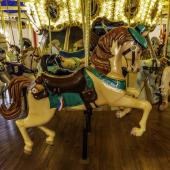

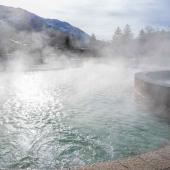
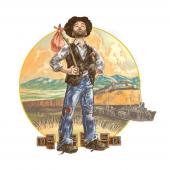

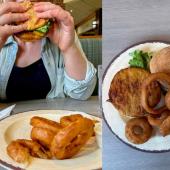
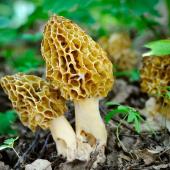
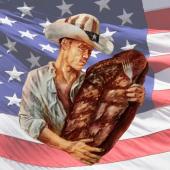

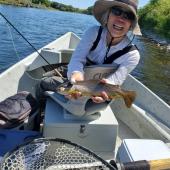
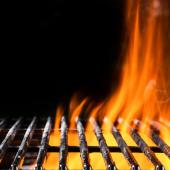
Leave a Comment Here